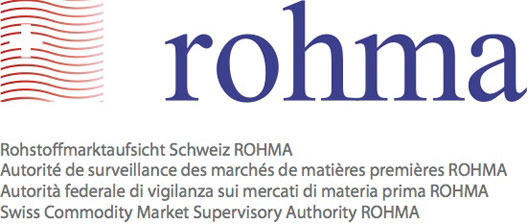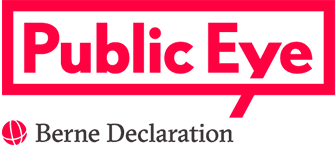Despite spectacular growth at the turn of the millennium, the Swiss commodity sector hardly ever received any attention, whether from the public or from politicians. A decade later however, this began to change. An enormous floatation on the London Stock Exchange of a previously private commodity company, as well as a string of revelations about the industry– first from non-governmental organizations, then from the media – increasingly brought the sector into the public domain.
In its "Background Report: Commodities" of March 2013 (PDF, 1.0 MB), the Federal Council acknowledged the problems of the commodity sector and set out the need for action:
“As the industry increases in size, it brings with it additional challenges that must be taken seriously, among others, in the domain of human rights and environmental protection in resource exporting countries, in the fight against corruption, and in connection with the phenomenon of the “resource curse” in developing countries. These challenges can also involve reputational risks for individual companies, and for Switzerland as a country, in particular, where the conduct of companies domiciled in Switzerland should run contrary to positions taken and supported by Switzerland in the domains of development policy, and the promotion of peace, human rights, and social and environmental standards.”
In the wake of the commodity report, it quickly became clear that voluntary measures were not sufficient. The problems that increasingly came to light made a sector-specific supervision, and an authority with its own legal basis, inevitable.
Real problems – that’s why ROHMA is needed
Even as the “Background Report: Commodities” was being drafted, several cases emerged that demonstrated in exemplary fashion how Swiss companies contribute to the resource curse. The revelations continued unabated after that, creating the pressure for action that led to the emergence of ROHMA.
Lacking contract transparency
The Zug company Glencore procured two licenses for the exploitation of the copper and cobalt mines, Kansuki and Mutanda. In order to obtain them, Glencore combined forces with Israeli businessman, Dan Gertler, who acted as a "door-opener" because of his close connection to President Joseph Kabila. These licenses were awarded without any process of tender at dumping prices to offshore companies owned by Gertler. Lacking any mining know-how, Gertler then re-sold parts of the licenses to Glencore. The benefits of the transaction, which actually should have gone to the Congolese state, landed in Gertler’s pocket. The state mining company, Gécamines, lost potential revenue to the value of 630 million dollars. Fair licensing agreements are one of the major challenges for producing countries. To achieve this, full transparency through publication of contracts is a necessary condition.
Serious suspicions of corruption
A similar case occupied the judiciary from six different countries in 2013. This case concerns the allocation of mining licenses in Guinea to Beny Steinmetz Group Resources, whose namesake - the Israeli billionaire Beny Steinmetz - is resident in Geneva. After a request for mutual assistance from both the U.S. and Guinea, in October 2013 the Geneva prosecutor opened an investigation into unknown persons for bribery of foreign public officials. The control centre of this opaque structure of offshore companies is also located in Geneva. One of the central suspicions being investigated is whether one of the wives of the former president of Guinea was bribed in order to obtain licenses for the extraction of high-quality iron ore deposits in the Simandou mine. While Steinmetz invested only 165 million dollars prior to get the licenses in 2009, the following year, the Brazilian mining giant, Vale, paid 2.5 billion dollars for 51 percent of the shares of the company that owned the licenses. This money should have belonged to the Guinean treasury.
Illegal Commissions
The Swiss trading company Gunvor is at the centre of an investigation for money laundering launched by the public prosecutor’s office. Between 2010 and 2012, a trader active in Geneva set-up a system of allegedly illegal "commission payments" through which he exported 18 million barrels of crude oil from Congo-Brazzaville, mostly as a result of deliveries arranged outside Nigerian territorial waters. The beneficiary was close to president Denis Sassou Nguesso, who is himself under suspicion of corruption. Two accounts at the Geneva branch of the bank Clariden Leu are still blocked today as a result.
Business with Politically Exposed Persons (PEP)
Since 2009, Trafigura has been participating in an opaque joint venture with General Leopoldino Fragoso do Nascimento (called "Dino") in Angola. The joint venture, run jointly with the former special adviser to the Angolan President, imports and distributes petroleum products. In 2011, it made sales of $3.3 billion, 50 percent of which belong to Cochan Ltd, a company registered to a Bahamas mailbox company. The director of Cochan’s Singapore subsidiary is also General Dino, who has several business interests in Angola. Through another Cochan company in Angola, he is also involved in Puma Energy, a subsidiary of Trafigura that operates service station networks in Africa, Latin America and Australia. With these and other businesses, the ever-busy confidant of President Dos Santos makes a total mockery of the Angolan law on administrative probity (Article 25/1 a).
In a similar vein, Trafigura has also taken root in Zimbabwe with a company that maintains close relationships with senior representatives of President Robert Mugabe’s ZANU-PF government. Between December 2013 and May 2014, the Swiss trader gradually built up important holdings in two companies that dominate the distribution of petroleum products in the country: Redan Petroleum (60%) and Sakunda Petroleum (49%). Senior officials of ZANU-PF are involved in these strategically positioned companies. Trafigura also controls the supply of the Feruka pipeline that supplies petroleum products from Beira in Mozambique to Harare.
Involvement in subsidies fraud
In October 2012, the Nigerian authorities sent letters to Switzerland requesting assistance with regard to five Swiss commodities traders. The companies were not accused directly, but were in possession of documents that could prove large-scale fraud by their Nigerian counterparts in relation to fuel imports. Between 2009 and 2011 Nigerian companies claimed unjustified government subsidies in the amount of $ 6.8 billion. Nigerian authorities and non-governmental organizations have shown how Swiss dealers helped their Nigerian partners in the fraud by documenting false quantities or prices. Many of these companies are connected to Nigerian senior officials. This example shows why, to prevent commodity traders - such as banks - from working with money from politically exposed persons at the expense of producing countries, traders must be made subject to statutory due diligence requirements.
Commodity laundering
In 2004 and 2005 the Swiss gold refinery Argor-Heraeus SA processed approximately three tons of gold from Uganda. For several years, the UN, NGOs and the media had been reporting that Uganda was serving as a transit country for gold from the Democratic Republic of Congo. According to Ugandan statistics, the country produced less than one percent of the gold it exported. The gold exports that were delivered to Argor had financed the activities of a paramilitary militia in Congo. In November 2013, the organization TRIAL filed a criminal complaint at the public prosecutor’s office against Argor-Heraeus SA for "qualified asset-laundering". The investigations in this classic case of commodity-laundering are ongoing. This case led to the conclusion in the parliamentary debate to include gold refineries and gold importers under ROHMA.
Aggressive Tax Avoidance
Controlled by Glencore, Mopani copper mine in Zambia has - despite a long copper price boom - never booked any profits and therefore never paid any income tax. Through base erosion and profit shifting, the Group headquartered in Baar significantly reduced the benefits the copper boom might have had for the African country and its people.
Switzerland is also used by foreign mining companies to engage in aggressive tax avoidance. Thus, the Brazilian mining giant Vale has, since 2006, brought several of its subsidiaries, which had previously been domiciled in offshore financial centres, together in the small Vaudois town of Saint-Prex. Until 2011, the Group enjoyed full tax exemption on both the municipal and cantonal levels. Thanks to the so-called Bonny Decree, only 20 percent of the profits from Vale International were taxed in Saint-Prex at the federal level between 2006 and 2012. This amounted, between 2006 and 2009, to CHF 15 billion. This represents 40 percent of the total profit of a group whose employees number 80,000 worldwide, of which, at the end of 2012, just 117 were working in Saint-Prex. In other words, the total profit generated by the Group was booked in Switzerland, even if it represents only a fraction of the real added value of the Swiss site – at the expense of the countries of production.
Putting words into action
The publication of the "Background Report: Commodities" was followed by an intense debate. First, in the public and thereafter in Parliament in the early spring session of 2013, the decision was made to launch an ambitious legislative double package, which after further intense parliamentary and public debate later became the Commodities Act (CA) and the Commodity Market Supervisory Authority Act (CMSAA). Although a referendum was initially anticipated on the laws, this did not take place and both laws came into force on April 1 2014.
The initial construction of ROHMA started in January, and just three months later, ROHMA started its work.



